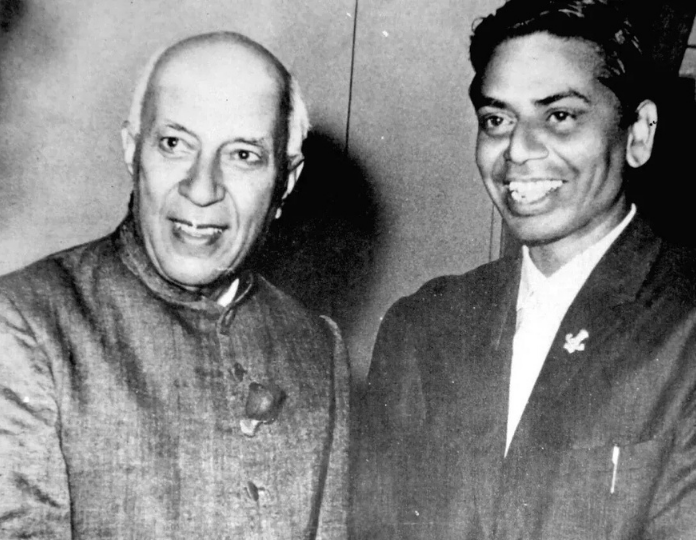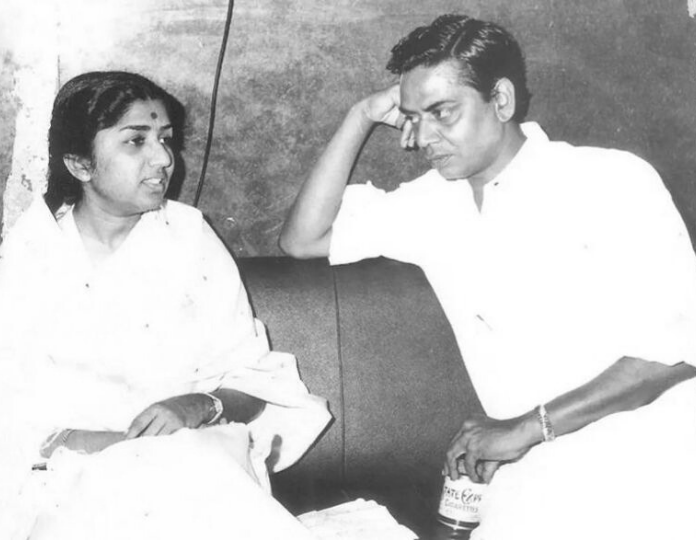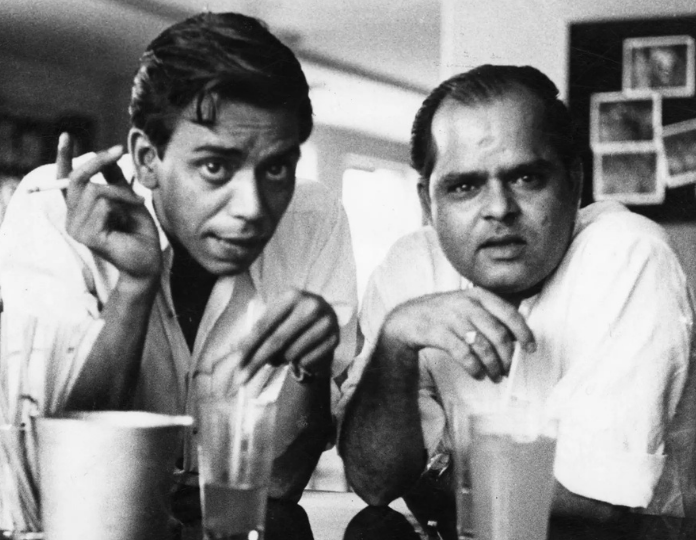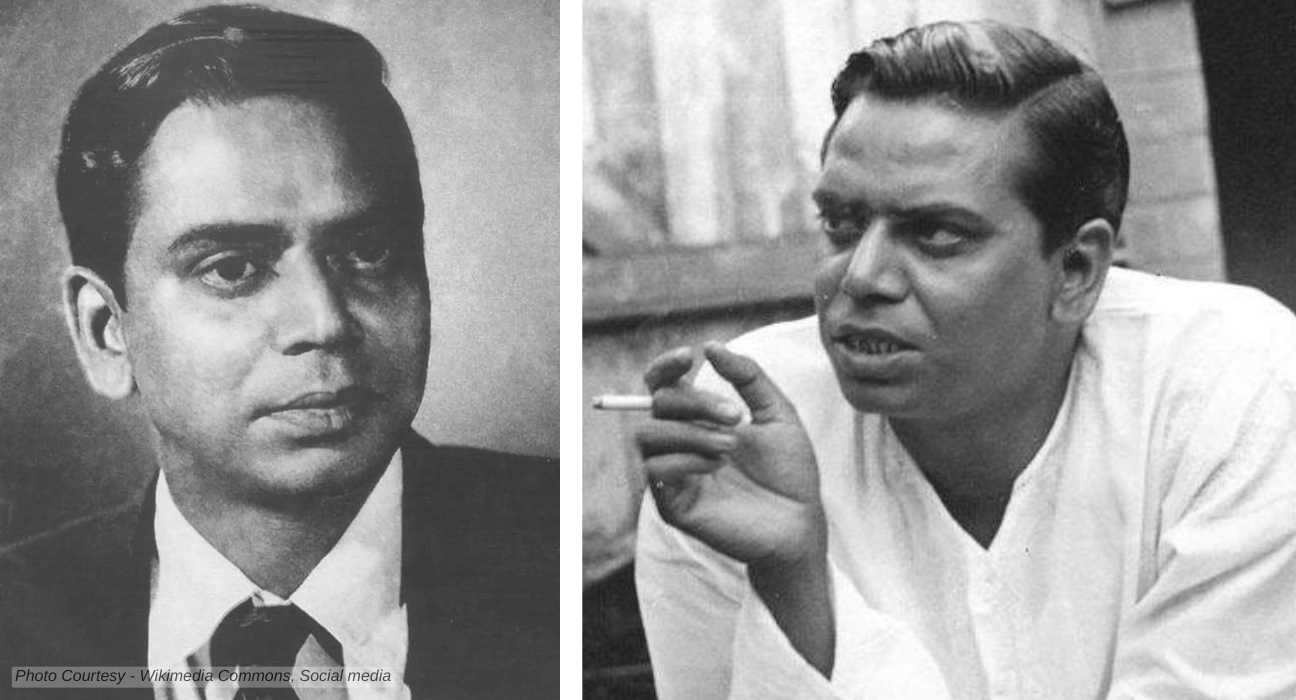The poet of the people, Shailendra’s lyrics often spoke of the sorrows and struggles of everyday life, yet they also carried a message of hope and resilience. Through his songs, he brought literature closer to the masses and, in turn, elevated the cinematic experience to new heights of emotional and intellectual engagement.
His family, hailing from the Ara district of Bihar, faced numerous challenges, which led them to move to Rawalpindi, where his father found work at a military hospital. Despite these hardships, Shailendra’s poetic spirit found its wings in the cultural milieu of Mathura, where he began composing poems alongside his friend Indra Bahadur Khare.
Shailendra – The Humble Begining
Born on August 30, 1923, in Rawalpindi, which is now in Pakistan, into a family originally from the Ara district of Bihar. His father, Kesari Lal, was working in a military hospital, while his mother, Parvati Devi, was a homemaker. The family’s move to Mathura when Shailendra was still a kid. In Mathura, family faced many challenges, from financial to deeply personal, like losing his mother, sister, and father. He bravely faced everything that life threw in his way and with some help from his friends and teachers, he continued his education.
He was always a poet at heart and had special human tendencies, which allowed his poetry to be connected to his roots. It was the time when freedom struggle was in full force and the atmosphere was full of rebellious ideas. Young Shailandra was not untouched by the mood of the time and started writing poems full of anti-colonial sentiment. His participation in the freedom struggle even resulted in going to jail.
Shailendra – In Mumbai
In 1947, he takes up the job at a railway yard in Mumbai as a welder while continuing his liturgical pursuits. He also joined the Indian People’s Theatre Association (IPTA), where he gets the chance to meet luminaries like Prithviraj Kapoor, Balraj Sahni, Ritwik Ghatak, Utpal Dutt, Khwaja Ahmad Abbas, Salil Chowdhury, Pandit Ravi Shankar, Amiya Bose, and many more. In the atmosphere of IPTA, his poetic talents flourished while he continued to attend Mushayras and Kavi Sammelans.
Shailendra’s personal experiences and his empathetic nature towards the underprivileged were reflected in his work. His lyrics often spoke of the sorrows and struggles of everyday life, yet they also carried a message of hope and resilience. He was a poet of the people, and his words continue to resonate with the masses, transcending time and cultural barriers.
The Collaboration with Raj Kapoor

It was during the Independence Day celebration program at IPTA that Raj Kapoor noticed Shailendra, who recited his anti-partition poem “Jalta Hai Punjab.” Raj Kapoor met him and asked him to write songs for his films, which he declined, saying famously “Meri Kavita Bikau Nahin Hai.” But after constant insistent from Raj Kapoor and in view of his own financial status, he agreed to give lyrics to the films.
In his debut, he wrote two songs, “Patli kamar hai” and “Barsaat mein,” for the film Barsaat (1949). This was the start of his iconic association with Raj Kapoor, singer Mukesh, and the composers Shankar-Jaikishan, which produced timeless classics that are celebrated to this day.
Their next Awaara established him as the top songwriter. The songs like “Awaara Hoon,” “Ghar Aaya Mera Pardesi,” “Tere Bina Aag Yeh Chandni” were instant hits.
Famous Songs For Raj Kapoor
The team gave songs like “Raja Ki Aayegi Baaraat” in Aah, “Nanhe Munne Bachche Teri Mutthi Mein Kya Hai,” “Tumhare Hain Tumse Daya Mangte Hain,” in Boot Polish, and “Mera Juta Hai Japani.” “Pyar Hua Iqrar Hua,” “Ramaiya Vastavaiya,” in Shree 420, “Yeh Raat Bheegi Bheegi,” in Chori Chori, “Zindagi Khwab Hai,” “Jaago Mohan Pyaare,” in Jagte Raho, “Kisi Ki Muskurahaton Pe Ho Nisar,” “Sab Kuchh Seekha Humne Na Seekhi Hoshiyari,” in Anari, “Main Nashe Mein Hoon,” “Nazar Nazar Se,” in Main Nashe Mein Hoon, “Hothon Pe Sachchai Rahti Hai,” “O Basanti Pavan Paagal,” in Jis Desh Men Ganga Behti Hai, “Bol Radha Bol,” “Dost Dost Na Raha,” “Har Dil Jo Pyaar Karega,” in Sangam, “Duniya Ki Sair Kar Lo,” “Raat Ke Hamsafar, Thak Ke Ghar Ko Chale,” “Josh-E-Jawani Haay Re Haay,” in Around The World, and “Ang Lag Jaa Balma,” “Jeena Yahan Marna Yahan, in Mera Nam Joker.
Shailendra’s lyrics, imbued with a blend of simplicity and philosophical depth, resonated with the masses and became the voice of the common man’s dreams and aspirations.
Shailendra – At the top of the world!
The 1950s and 1960s were the golden era for Shailendra, as he penned lyrics for numerous successful Hindi films. Shailendra’s passion for poetry was not just a professional pursuit but a personal refuge that provided solace and a means to articulate his thoughts and feelings. His verses often reflected his deep empathy for the underprivileged and his desire for social change.
Shailendra worked with C Ramchandra in Anarkali (1953) which has the all time classic “Yeh Zindagi Usi Ki Hai.” It also has gems like “Jaag Dard-E-Ishq Jaag,” and “Zindagi Pyar Ki.” He wrote for Bimal Roy’s films like Do Bigha Zamin (1953), Madhumati (1958), Yahudi (1958), and Parakh (1960). He also wrote the dialogue for Bimal Roy’s “Parakh” In 1960, it was the only film he wrote.
Shailendra also worked with other music composers like Anand Math (1952), Daag (1952), Patita (1953), Shikast (1953), Badnaam (1952), Shrimatiji’ (1952), Bhai Saheb (1954), Chingari (1955), Pipili Saheb (1954), Seema (1955), Ek Gaon Ki Kahani (1957), Musafir (1957), Ab Dilli Dur Nahin (1957), Indrani (1958), Insaan Jaag Utha (1959), Kala Bazaar (1960), Anuradha (1960), Dil Apna Aur Preet Parai (1960), Usne Kaha Tha (1960), and many more

Some of his famous songs from this period include “Dharti Kahe Pukaar Ke.” “Aaja Ri Aa Nindiya Tu Aa,” “Jab Jab Phool Khile,” “Khoya Khoya Chand,” “Bol Ri Kathputli,” “Naghm-E-Dil Suna Suna Tu,” “Chadh Gayo Paapi Bichhua,” “Suhana Safar Aur Yeh.” “Yeh Mera Diwanapan Hai.” “Tu Pyar Ka Saagar Hai,” “O Sajana, Barkha Bahar Aai,” “Ajeeb Dastan Hai Yeh,” “Jhoomti Chali Hawa,” “Dil Tadap Tadap Ke Kah Raha Hai,” “Zulmi Sang Aankh Ladi Re,” “Jaanu Jaanu Ri,” “Rimjhim Ke Tarane Leke Aayi Barsaat.”
In the 60s
1960s he started with giving Shammi Kapoor his signature Yahoo, in Junglee (1961). In the film he wrote the emotional “Ehsaan Tera Hoga Mujh Par.” He also continued his association with Bimal Roy Bandini (1963). He wrote haunting “Mere Sajan Hain Us Paar,” and “Abke Baras Bhej Bhaiya.”
One of Shailendra’s most significant work came in Vijay Anand’s Guide (1965). For the film, he collaborated with SD burman and wrote one of the most versatile and powerful song album of all time. The film had gems like feminist anthem “Aaj Phir Jeene Ki,” and semi classical “Piya Tose Naina Laage Re.” It also had philosophical “wahan kaun hai tera,” and intense “Din Dhal Jaye.”
Some of his other notable films of this period were Kaanch Ki Gudiya (1961), Jab Pyar Kisise Hota Hai (1961), Sangeet Samrat Tansen (1962), Half Ticket (1962), Professor (1962), Dil Ek Mandir (1963), Hamrahi (1963), Ayee Milan Ki Bela (1964), Rajkumar (1964), Gumnaam (1965), Guide (1965), Amrapali (1966), Love In Tokyo (1966), Suraj (1966), An Evening In Paris (1967), Jewel Thief (1967), Raat Aur Din (1967), Brahmachari (1967), Door Ka Rahi (1971), and many more.
Some of his other songs include “Ruk Ja Raat, Thahar Ja Re Chanda.” “Yaad Na Jaye Bite Dino Ki,” “Tera Mera Pyar Amar,” “Aake Seedhi Lagi Dil Pe Jaise Katariya,” “Nache Man Mora Magan,” “Bol Meri Taqdeer Mein Kya Hai,” “Khuli Palak Mein Jhootha Gussa.” “Poochho Na Kaise Maine Rain Bitai,” “Aaja Aai Bahaar,” “Tere Mere Sapne,” “Laagi Naahi Chhoote Ram,” “Jaan Pehchan Ho,” “Hum Kaale Hain Th Kya Hua,” “Laal Chhadi Maidan Khadi,” “Tadap Yeh Din Raat Ki,” “Tumhen Yaad Karte Karte,” “Raat Ke Humsafar,” “Dil Ki Girah Khol Do,” “Na Chhedo Kal Ke Afsane,” “Main Gaaoon Tum So Jao,” and many more.


Shailendra – The Family Man
Shailendra married Sahkuntala Shalendra, who was from Jhansi, in 1948. They went on to have 5 kids: Shaily Shailendra, Amla Shailendra Mazumdar, Manoj Shankar Shailendra, Dinesh Shailendra, and Gopa Shailendra. A true family man enjoyed the simple pleasures of life, such as relishing meals of dal, bhaat, roti, and green chillies. His love for the rain was so profound that he named his bungalow ‘Rimjhim’, which means ‘drizzling’ in Hindi.
Shailendra’s Dream
His life’s ambition, the only movie he produced, was the cult classic “Teesri Kasam,” based on a story of Faneeswar Nath Renu, “Mare Gaye Gulfam.” The film starring Raj Kapoor and Waheeda Rahman was released a few months prior and flopped badly. The cinematic gem directed by Basu Bhattacharya explores themes of purity, love, and societal perceptions. Subrata Mitra’s cinematography captures the simplicity of rural life while highlighting the characters’ emotions.
The music by Shankar-Jaikishan is a highpoint of the films; the film’s soulful soundtrack and philosophical songs like “Duniya Banane Wale,” “Sajan re Jhooth mat bolo,” “Sajanwa Bairi Ho Gaye Hamaar,” “Chalat Musafir,” “Paan Khaaye Saiyaan Hamaaro,” and “Lali Lali Doliya Mein Lali Re” by Shailandra and Hasrat Jaipuri add to the narrative and the emotional depth of the film.

Shailendra’s Doom
Due to various reasons, the movie got delayed and the budget went out of hand and when it finally released, the reception was unprecedentedly bad for a big-budget Raj Kapoor starrer. It’s really a topic of research for upcoming generations to know about the reason for the failure of such a nice film. The film’s failure and the behaviours of his own people broke his heart. Shailandra was a poet in a true sense; he never knew the rules of business nor had the cunning to deal with people. Teesri Kasam left, the magician of words, penniless and in debt. Reportedly, he wrote the song “Rula Ke Gaya Sapna Mera” in Jewel Thief in his own misery.
On Dec 14 of 1966, which was co-incidently the birthday of his long-time friend and collaborator Raj Kapoor, Shailendra took his last breath and passed away quietly, a broken man with a broken heart.
Teesri Kasam, now considered one of the greatest movies of all time, won the National Award for Best Feature Film in 1967. But Shailendra was no more. His wife, with his son Shaily and Raj Kapoor, went to Delhi for the ceremony at Rashtrapati Bhavan and received the award on his behalf.
That was the end of one of the most successful and celebrated lyricists of all time, whose songs have immortalised so many movies, the philosopher who teaches the value of truth—”Sajan re jhooth mat bolo, khuda ke paas jaana hai.” and karma—”Bhalaa kije bhalaa hoga, bura kije bura hoga”— left the world an unhappy man.
Shailendra on IMDB














Leave feedback about this